2024 Adult Book Club Selections
Location: Plymouth Library Meeting Room
Time: 10am - 11am
Limited copies of each title will be available for pick-up at the 2nd floor circulation desk one month prior to the scheduled book discussion date.
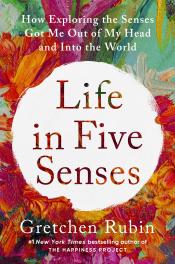
Life in Five Senses by Gretchen Rubin
Thursday, January 4
For more than a decade, Gretchen Rubin had been studying happiness and human nature. Then, one day, a visit to her eye doctor made her realize that she’d been overlooking a key element of happiness: her five senses. She’d spent so much time stuck in her head that she’d allowed the vital sensations of life to slip away, unnoticed. This epiphany lifted her from a state of foggy preoccupation into a world rediscovered by seeing, hearing, smelling, tasting, and touching.
In this journey of self-experimentation, Rubin explores the mysteries and joys of the five senses as a path to a happier, more mindful life. Drawing on cutting-edge science, philosophy, literature, and her own efforts to practice what she learns, she investigates the profound power of tuning in to the physical world.
From the simple pleasures of appreciating the magic of ketchup and adding favorite songs to a playlist, to more adventurous efforts like creating a daily ritual of visiting the Metropolitan Museum of Art and attending Flavor University, Rubin show us how to experience each day with depth, delight, and connection. In the rush of daily life, she finds, our five senses offer us an immediate, sustainable way to cheer up, calm down, and engage the world around us—as well as a way to glimpse the soul and touch the transcendent.
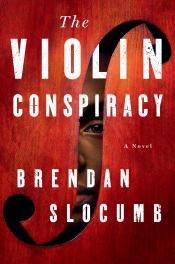
The Violin Conspiracy by Brendan Slocumb
Thursday, February 1
Ray McMillian loves playing the violin more than anything, and nothing will stop him from pursuing his dream of becoming a professional musician. Not his mother, who thinks he should get a real job, not the fact that he can't afford a high-caliber violin, not the racism inherent in the classical music world. And when he makes the startling discovery that his great-grandfather's fiddle is actually a priceless Stradivarius, his star begins to rise. Then with the international Tchaikovsky Competition—the Olympics of classical music—fast approaching, his prized family heirloom is stolen. Ray is determined to get it back. But now his family and the descendants of the man who once enslaved Ray's great-grandfather are each claiming that the violin belongs to them. With the odds stacked against him and the pressure mounting, will Ray ever see his beloved violin again?
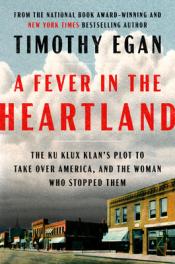
A Fever in the Heartland by Timothy Egan
Thursday, March 7
The Roaring Twenties--the Jazz Age--has been characterized as a time of Gatsby frivolity. But it was also the height of the uniquely American hate group, the Ku Klux Klan. Their domain was not the old Confederacy, but the Heartland and the West. They hated Blacks, Jews, Catholics and immigrants in equal measure, and took radical steps to keep these people from the American promise. And the man who set in motion their takeover of great swaths of America was a charismatic charlatan named D.C. Stephenson.
Stephenson was a magnetic presence whose life story changed with every telling. Within two years of his arrival in Indiana, he’d become the Grand Dragon of the state and the architect of the strategy that brought the group out of the shadows – their message endorsed from the pulpits of local churches, spread at family picnics and town celebrations. Judges, prosecutors, ministers, governors and senators across the country all proudly proclaimed their membership. But at the peak of his influence, it was a seemingly powerless woman – Madge Oberholtzer – who would reveal his secret cruelties, and whose deathbed testimony finally brought the Klan to their knees.
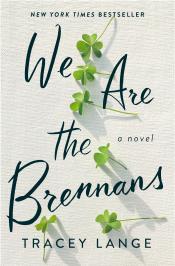
We Are the Brennans by Tracey Lange
Thursday, April 4
When twenty-nine-year-old Sunday Brennan wakes up in a Los Angeles hospital, bruised and battered after a drunk driving accident she caused, she swallows her pride and goes home to her family in New York. But it’s not easy. She deserted them all―and her high school sweetheart―five years before with little explanation, and they've got questions.
Sunday is determined to rebuild her life back on the east coast, even if it does mean tiptoeing around resentful brothers and an ex-fiancé. The longer she stays, however, the more she realizes they need her just as much as she needs them. When a dangerous man from her past brings her family’s pub business to the brink of financial ruin, the only way to protect them is to upend all their secrets―secrets that have damaged the family for generations and will threaten everything they know about their lives. In the aftermath, the Brennan family is forced to confront painful mistakes―and ultimately find a way forward, together.
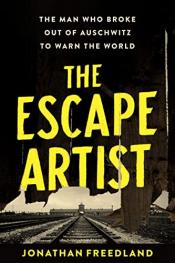
The Escape Artist by Jonathan Freedland
Thursday, May 2
In April 1944, Rudolf Vrba became the first Jew to break out of Auschwitz—one of only four who ever pulled off that near-impossible feat. He did it to reveal the truth of the death camp to the world—and to warn the last Jews of Europe what fate awaited them at the end of the railway line. Against all odds, he and his fellow escapee, Fred Wetzler, climbed mountains, crossed rivers and narrowly missed German bullets until they had smuggled out the first full account of Auschwitz the world had ever seen—a forensically detailed report that would eventually reach Franklin Roosevelt, Winston Churchill and the Pope.
And yet too few heeded the warning that Vrba—then just nineteen years old—had risked everything to deliver. Some could not believe it. Others thought it easier to keep quiet. Vrba helped save 200,000 Jewish lives—but he never stopped believing it could have been so many more.
This is the story of a brilliant yet troubled man—a gifted “escape artist” who even as a teenager understand that the difference between truth and lies can be the difference between life and death, a man who deserves to take his place alongside Anne Frank, Oskar Schindler and Primo Levi as one of the handful of individuals whose stories define our understanding of the Holocaust.
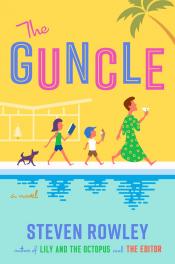
The Guncle by Steven Rowley
Thursday, June 6
Patrick, or Gay Uncle Patrick (GUP, for short), has always loved his niece, Maisie, and nephew, Grant. That is, he loves spending time with them when they come out to Palm Springs for weeklong visits, or when he heads home to Connecticut for the holidays. But in terms of caretaking and relating to two children, no matter how adorable, Patrick is honestly a bit out of his league.
So when tragedy strikes and Maisie and Grant lose their mother and Patrick’s brother has a health crisis of his own, Patrick finds himself suddenly taking on the role of primary guardian. Despite having a set of “Guncle Rules” ready to go, Patrick has no idea what to expect, having spent years barely holding on after the loss of his great love, a somewhat-stalled career, and a lifestyle not-so-suited to a six- and a nine-year-old. Quickly realizing that parenting—even if temporary—isn’t solved with treats and jokes, Patrick’s eyes are opened to a new sense of responsibility, and the realization that, sometimes, even being larger than life means you’re unfailingly human.
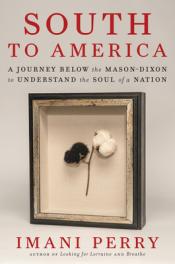
South to America by Imani Perry
Thursday, July 11
We all think we know the South. Even those who have never lived there can rattle off a list of signifiers: the Civil War, Gone with the Wind, the Ku Klux Klan, plantations, football, Jim Crow, slavery. But the idiosyncrasies, dispositions, and habits of the region are stranger and more complex than much of the country tends to acknowledge. In South to America, Imani Perry shows that the meaning of American is inextricably linked with the South, and that our understanding of its history and culture is the key to understanding the nation as a whole.
This is the story of a Black woman and native Alabaman returning to the region she has always called home and considering it with fresh eyes. Her journey is full of detours, deep dives, and surprising encounters with places and people. She renders Southerners from all walks of life with sensitivity and honesty, sharing her thoughts about a troubling history and the ritual humiliations and joys that characterize so much of Southern life.
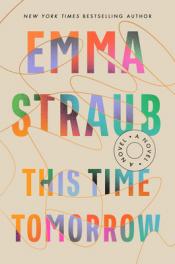
This Time Tomorrow by Emma Straub
Thursday, August 1
On the eve of her 40th birthday, Alice's life isn't terrible. She likes her job, even if it isn't exactly the one she expected. She's happy with her apartment, her romantic status, her independence, and she adores her lifelong best friend. But her father is ailing, and it feels to her as if something is missing. When she wakes up the next morning she finds herself back in 1996, reliving her 16th birthday. But it isn't just her adolescent body that shocks her, or seeing her high school crush, it's her dad: the vital, charming, 40-something version of her father with whom she is reunited. Now armed with a new perspective on her own life and his, some past events take on new meaning. Is there anything that she would change if she could?
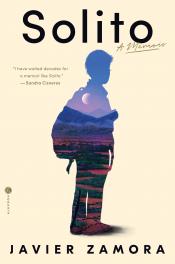
Solito by Javier Zamora
Thursday, September 5
Trip. My parents started using that word about a year ago--"one day, you'll take a trip to be with us. Like an adventure."
Javier's adventure is a three-thousand-mile journey from his small town in El Salvador, through Guatemala and Mexico, and across the U.S. border. He will leave behind his beloved aunt and grandparents to reunite with a mother who left four years ago and a father he barely remembers. Traveling alone except for a group of strangers and a coyote hired to lead them to safety, Javier's trip is supposed to last two short weeks.
At nine years old, all Javier can imagine is rushing into his parents' arms, snuggling in bed between them, living under the same roof again. He does not see the perilous boat trips, relentless desert treks, pointed guns, arrests and deceptions that await him; nor can he know that those two weeks will expand into two life-altering months alongside a group of strangers who will come to encircle him like an unexpected family.

We Begin at the End by Chris Whitaker
Thursday, October 3
Right. Wrong. Life is lived somewhere in between.
Duchess Day Radley is a thirteen-year-old self-proclaimed outlaw. Rules are for other people. She is the fierce protector of her five-year-old brother, Robin, and the parent to her mother, Star, a single mom incapable of taking care of herself, let alone her two kids.
Walk has never left the coastal California town where he and Star grew up. He may have become the chief of police, but he’s still trying to heal the old wound of having given the testimony that sent his best friend, Vincent King, to prison decades before. And he's in overdrive protecting Duchess and her brother.
Now, thirty years later, Vincent is being released. And Duchess and Walk must face the trouble that comes with his return. We Begin at the End is an extraordinary novel about two kinds of families—the ones we are born into and the ones we create.
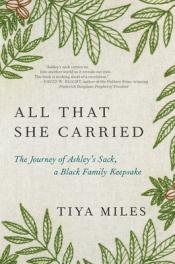
All That She Carried by Tiya Miles
Thursday, November 7
In a display case in the Smithsonian’s National Museum of African American History and Culture sits a rough cotton bag, called Ashley’s Sack, embroidered with just a handful of words that evoke a sweeping family story of loss and of love, passed down through generations.
In 1850s South Carolina, an enslaved woman named Rose gave this sack filled with a few precious items to her daughter, Ashley, as a token of love and to try to ensure Ashley’s survival as well. Soon after, the nine-year-old girl was separated from her mother and sold. Decades later, Ashley’s granddaughter Ruth embroidered this family history on the bag in spare yet haunting language—including Rose’s wish that “It be filled with my Love always.” Now, in this illuminating, deeply moving new book inspired by Rose’s gift to Ashley, historian Tiya Miles carefully unearths these women’s faint presence in archival records and draws on objects and art, to follow the paths of their lives—and the lives of so many women like them—in a singular and revelatory history of the experience of slavery, and the uncertain freedom afterward, in the United States.
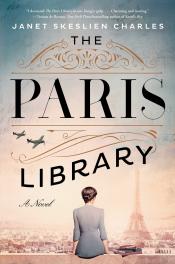
The Paris Library by Janet Skeslien Charles
Thursday, December 5
Paris, 1939: Young and ambitious Odile Souchet has it all: her handsome police officer beau and a dream job at the American Library in Paris. When the Nazis march into Paris, Odile stands to lose everything she holds dear, including her beloved library. Together with her fellow librarians, Odile joins the Resistance with the best weapons she has: books. But when the war finally ends, instead of freedom, Odile tastes the bitter sting of unspeakable betrayal.
Montana, 1983: Lily is a lonely teenager looking for adventure in small-town Montana. Her interest is piqued by her solitary, elderly neighbor. As Lily uncovers more about her neighbor’s mysterious past, she finds that they share a love of language, the same longings, and the same intense jealousy, never suspecting that a dark secret from the past connects them.

